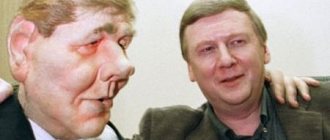Kesaev Igor
Kesaev Igor Albertovich (born October 30, 1966, Ordzhonikidze, North Ossetian Autonomous Soviet Socialist Republic, RSFSR, USSR) is a Russian businessman. The owner and president of the Group, which includes Russia's largest tobacco distributor group, the Dixie retail chain and.
In 1984-1986 he served in the Armed Forces of the USSR. In 1993 he graduated from MGIMO. From 1988 to 1992, he first worked as the head of the banking operations insurance department of the Absolut-Moscow insurance company, then became the director of the Absolut-Moscow insurance company and the general director of the Jupiter insurance company. In 1991 he created a trading company.
In 2005, he acquired controlling stakes in two military-industrial complex enterprises: the Kovrov Mechanical Plant (KMZ) and the Degtyarev Plant. Through Orton Oil, together with Shalva, Chigirinsky parity owned Bennfield Ltd., which controlled 47% of Sibir Energy. Sibir Energy acquired a stake in Sibir Energy from Shalva Chigirinsky in 2005. In 2009, he sold his stake in Sibir Energy to Gazprom Neft.
In 2006, he merged the tobacco business with. In December 2013, its suppliers, tobacco corporations Philip Morris International and JTI, each bought a 20% stake in Megapolis for $1.5 billion. In 2006, together with Shalva Chigirinsky, he won the competition for the reconstruction of New Holland in St. Petersburg. In December 2007, Mercury Group of Companies, owned by Igor Kesaev, acquired 51% from Oleg Leonov.
Igor Kesaev is the president of the National Non-Profit Foundation "Monolith". Owns the World Fashion Channel, a Russian 24-hour satellite TV channel about fashion. Since 2011, he has been a member of Forbes magazine’s “Russia’s 200 Richest Businessmen” rating. In 2020, it took 41st place in this ranking with a capital of $2.4 billion.
He is interested in modern art. His wife Stella Kesaeva owns the Stella Art Foundation gallery. The couple have three children.
Related Articles
Igor Kesaev’s wife – photo
They all work in Moscow City, and in the same tower the new wife opened a restaurant. Until recently, Igor Kesaev and his wife Stella lived in a happy marriage. There was no sign of turmoil on the horizon of family ties, but young love Olga Klimenko unexpectedly entered her husband’s life. It was simply impossible to pass by the beauty, winner of the title “Miss Ukraine 2013”. The man fell in love, experiencing a new wave of feelings. The Zhytomyr beauty took a special place in his heart. The oligarch left the family and married his beloved.
Igor organized his own World Fashion TV channel, where his new wife tries herself as a TV presenter of a cooking show. At social events, Igor Kesaev and his wife Olga appear together, demonstrating a warm relationship and complete mutual understanding. His companion at one time graduated from a university with a degree in Sociology. The girl loves to sing karaoke and is fond of strip plastic. She differs from other wives of billionaires and glamorous divas in her modesty and taste. Olga does not have active social networks; she does not chase popularity by appearing on Instagram.
There is a photo of Igor Kesaev’s wife on the Internet, where they are depicted together with his daughters and new wife. The entrepreneur managed to create a strong home, a friendly family, and maintains friendship with his ex-wife, who gave him many years. He has two beautiful daughters.
Cupid's arrows pierced the oligarch's heart in 2020, and he divorced Stella. Although she bears no grudge against her husband, she still calls him husband and speaks with gratitude of the years given to her. Stella, unlike Olga, maintains her life on social networks. The businesswoman has a crowd of followers casting admiring glances in her direction. Kesaev himself, who once graduated from MGIMO, achieved success thanks to his determination and ability to overcome difficulties, despite times of crisis. Now he and his family are reaping the benefits of business and success in their youth.
Perhaps interesting: wife of Karen Shakhnazarov, wife of Maxim Dakhnenko.
Katsiev Sergey
Katsiev Sergey Soltanovich (born January 11, 1958, Voznesensk, Nikolaev region, Ukrainian SSR, USSR) is a Russian entrepreneur, co-owner of the Mercury group.
In 1981 he graduated from the Moscow State Institute of International Relations (MGIMO) with a degree in international economics.
From 1981 to 1984 he served as a military translator in Libya on assignment. From 1984 to 1987 he worked at the Moscow Central Customs. In 1987, he entered full-time graduate school at MGIMO University of the USSR Ministry of Foreign Affairs. Since 1990, he taught at the Department of Political Economy after graduating from graduate school. Since 1991, he was appointed senior economist at the USSR Trade Mission in the Netherlands.
From 1993 to 1998 he headed (import of tobacco products), the main owner of which was Igor Kesaev. In 1998, Katsiev founded, which also engaged in trade in tobacco products.
Jump from zero to billionaires by Igor Kesaev
In 2006, Katsiev and Kesaev united theirs.
In April 2020, Sergey Katsiev left the post of president of Megapolis Group of Companies, and in June - chairman of the board of directors of DIXY Group. Katsiev is also the owner of the company producing medicinal mineral water “Nizhny Karmadon” in the Caucasus.
Since 2014, he has been a member of Forbes magazine’s “Russia’s 200 Richest Businessmen” rating. In 2020, it took 86th place in this ranking with a capital of $1.1 billion.
Married. Has two children.
Related Articles
Igor Kesaev is an entrepreneur, owner and president of the Group.
Biography
Igor Kesaev was born on October 30, 1966 in Ordzhonikidze (currently Vladikavkaz) in the North Ossetian Autonomous Soviet Socialist Republic.
Education
In 1993, he graduated from the Moscow State Institute of International Relations (MGIMO).
Career
1988 - 1992 — Head of the banking operations insurance department of the Absolut-Moscow insurance company, director of the Absolut-Moscow insurance company, general director of the Jupiter insurance company.
1991 - created a trading company.
Since 1992 - owner and president of the Group.
2005 - acquired controlling stakes in two military-industrial complex enterprises: Kovrov Mechanical Plant (KMZ) and the Degtyarev Plant.
Through Orton Oil, together with Shalva, Chigirinsky parity owned Bennfield Ltd., which controlled 47% of Sibir Energy. Sibir Energy acquired a stake in Sibir Energy from Shalva Chigirinsky in 2005.
2006 - merged the tobacco business with. .
Together with Shalva Chigirinsky, he won the competition for the reconstruction of New Holland in St. Petersburg.
In December 2007, the owned Group acquired a 51% controlling stake from Oleg Leonov. According to experts, the cost of the transaction was $600 million.
In October 2007, he agreed with Armen Yeganyan to purchase his stake in OJSC Moscow Wine and Cognac Factory KiN. The transaction cost was $15 million. Having never received the shares, in 2010 he filed a complaint with the Helsinki Commission of the US Congress, the reason for which, according to him, was the illegal seizure of KiN by initiating a criminal case against Armen Yeganyan. .
2009 - sold his share of Sibir Energy to Gazprom Neft.
Dear Alyson Tabbitha, get ready to vacate the throne!
Instagram: https://www.instagram.com/sladkoslava
Yes, this is exactly what numerous fans of Ilona Bugaeva began to write on the Internet when photographs of cosplay works poured into her social networks like from a cornucopia. Sweet Belle from “Beauty and the Beast”, gloomy youngster Wednesday from “The Addams Family”, shy Hermione from “Harry Potter” - the girl’s fans did not believe that all these images were made by the same person. Until Ilona Bugaeva began working seriously in cosplay, only one master of absolute transformation was recognized in the gaming world - the American Alison Tabbita.
Instagram: https://www.instagram.com/sladkoslava
Alas, nothing lasts forever in this world, including in the cosplay community: Alison herself moved a little on her firmly standing pedestal and condescendingly admitted that her rival is indeed incredibly talented.
The young cosplayer later said that the greatest help in her development as a professional in this area of culture came, paradoxically as it sounds, from Russian critics. “Our critics are the most impartial, the most picky, and specialists of the highest class, when compared with colleagues from other countries,” Ilona Bugaeva said today. Continuation of that interview: “Take, for example, the Ava Expo 2014 exhibition, or the Miss IGM competition a year later (my first serious live appearances). Those who have gone through the selection process for these events are truly incredibly good. Any cosplay competition in Russia was and is held at such a high and at the same time merciless level that not everyone becomes a star. Many break down and despair, and only a few turn into real masters and continue to work.”
Instagram: https://www.instagram.com/sladkoslava
An amazing fact: Ilona has practically no haters, neither on social networks nor at “live” events! A girl cosplayer explains it this way: “There are a lot of haters in our profession for those who do a bad job. If haters start writing nasty things, then these unpleasant remarks directly relate to the result: the costume is not similar enough to the original, or the makeup is not entirely accurate, or the character of the hero is different from the prototype.” By the way, her Instagram and other social networks. Networks were conducted from the very beginning in English. “Latin Americans, Spaniards, English-speaking visitors, fans from different European countries began to come to my pages, and it was easier for me from the very beginning to post everything in English - so that everyone could understand me,” this explanation was given by Ilona. She also said on this topic: “All my trips abroad were connected precisely with the fact that I wrote pages in English. They found me not by the number of subscribers, not by activity, but by my texts through a search engine.”
Instagram: https://www.instagram.com/sladkoslava
Her triumphant (there is no other way to say it) procession can hardly be called an ascent to the Olympus of the world of cosplayers. Rather, it was a sharp start and a rapid rise - so quickly the girl gained worldwide popularity. Fans of the beautiful Russian woman did not have time to like her new works, and foreign sites wrote non-stop: “This is not just a talented artist, but a many-faced goddess - she so skillfully works out every detail in her works.” "Chameleon cosplayer!" - that’s what they called her with surprise and delight on foreign resources, adding: “It’s hard to even imagine what kind of costume and makeup she can’t handle. As soon as her new photos are opened, your hand reaches out to like it.”
Instagram: https://www.instagram.com/sladkoslava
Here is a list of the most successful images presented to fans by a talented girl from St. Petersburg, in addition to her works already mentioned:
- Joker from Suicide Squad;
- Yolandi Visser - singer and actress from South Africa;
- original American Billie Eilish;
- Harley Quinn, Joker's girlfriend;
- Princess Anna from Disney's Frozen;
- Vanessa, the heroine of the cartoon series “The Little Mermaid”;
- Tyrell Margaeri - red-haired beauty from "Games of Thrones";
- Ellie from The Last of Us.
Instagram: https://www.instagram.com/sladkoslava
Regarding the latter, here is a fragment from Ilona’s story about how she worked on the image of Tyrell: “I made her so naturally, without any special difficulties, because I saw some of my own features in her. But Khaleesi Targaryen seemed to be preventing me from approaching her, or rather, I was afraid to take on the white-haired heroine of “Games of Thrones” for quite a long time, I was afraid of doing something wrong and ruining everything.”
Instagram: https://www.instagram.com/sladkoslava
Another important fact should be noted in the work of a cosplay girl: she pays first of all attention to the face, working on every smallest detail of makeup. “That’s why most of my photographs are portraits, and not full-length. Face: tone, location of freckles, arch of the eyebrows, shape of the lips and color of lipstick - if all these little details are taken into account, the result will have the desired impression,” her words.
Notes
- ↑ The richest businessmen of Russia - 2012
- ↑ Crooked route of the “tobacco captain”
- ↑ How Igor Kesaev drank cognac
- ↑ Igor Kesaev parted ways with Sibir Energy
- ↑ Igor Kesaev invests $1 million in the MGIMO Endowment
- ↑ Forbes profile
- ↑ Fencing ceremony
Kesaev, Igor Albertovich
(born October 30, 1966, Ordzhonikidze, North Ossetian Autonomous Soviet Socialist Republic)—entrepreneur. The owner and president of the Group, which, in particular, includes the largest tobacco distributor in Russia, the Group, the Dixy retail chain and a large developer, Mercury Development.
President of the National Non-Profit Foundation "Monolith".
Biography
Igor Kesaev was born on October 30, 1966 in Ordzhonikidze (currently Vladikavkaz) in the North Ossetian Autonomous Soviet Socialist Republic.
Served in the army.
From 1988 to 1992 - head of the banking operations insurance department of the Absolut-Moscow insurance company, director of the Absolut-Moscow insurance company, general director of the Jupiter insurance company.
Later he became chairman of the board of directors of Mosexim Bank, whose founders included JSC Trade and Financial, whose general director at one time was Igor Kesaev. In December 1999, Moseximbank's license was taken away.
In 1991 he created a trading company.
Since 1992, owner and president of the Group.
In 1993 he graduated from the Moscow State Institute of International Relations.
In 2005, he acquired controlling stakes in two military-industrial complex enterprises: the Kovrov Mechanical Plant (KMZ) and the Degtyarev Plant.
Through Orton Oil, together with Shalva, Chigirinsky parity owned Bennfield Ltd., which controlled 47% of Sibir Energy. Sibir Energy acquired a stake in Sibir Energy from Shalva Chigirinsky in 2005.
In 2006, he merged the tobacco business with.
In 2006, together with Shalva Chigirinsky, he won the competition for the reconstruction of New Holland in St. Petersburg.
In December 2007, the Mercury Group of Companies, owned by Igor Kesaev, acquired 51% from Oleg Leonov - according to experts, for 600 million US dollars.
In mid-July 2010, Russian lawyer Alexander Dobrovinsky filed a complaint with the Helsinki Commission of the US Congress, the reason for which, according to him, was the illegal seizure of KiN by initiating a criminal case against Aren Yeganyan. According to Mr. Dobrovinsky, his competitors could have been behind the attempt to seize Mr. Yeganyan’s property, “which may include Russian businessman Igor Kesaev.”
In 2009, he sold his stake in Sibir Energy to Gazprom Neft.
To information
The family of Igor Albertovich Kasaev belonged to an influential Ossetian clan. Therefore, the young man was educated at the prestigious Moscow State Institute of International Relations (MGIMO). But after graduating from university, he did not follow the diplomatic line, but took up the insurance business that was emerging at the turn of the 1980s and 1990s.
In this matter, he was helped by his connections in the highest circles of the Ossetian government. The then Chairman of the Council of Ministers of North Ossetia Sergei Khetagurov
was closely connected with Moseximbank, through which money was withdrawn from the country abroad. This credit institution entered into a tripartite agreement with the investment company and the Jupiter insurance company, of which Kesaev was made the head. Jupiter insured the risks of Russian investors when investing in the American stock market.
At some point, Kesaev himself turned out to be the chairman of the board of directors of Moseximbank. In addition, he managed to be the general director of the bank, which was one of the founders of the bank. Moseximbank had a reputation as one of the main credit institutions through which contracts for the sale of Russian weapons and components passed. For example, Moseximbank acted as a third party when the Bank of Moscow and Sukhoi OKB OJSC signed a general cooperation agreement. Around the same time, the Bank of Moscow acquired a 19% stake in Mosexim.
However, at the very end of the 1990s, Moseximbank’s license was taken away. The head of the Main Directorate of Federal Customs Revenue sent a telegram to the State Customs Committee in which he demanded that bank guarantees issued by Moseximbank not be accepted as security for payment of customs duties. And in October 2000, the Moscow Arbitration Court declared the bank bankrupt and opened bankruptcy proceedings against it. The applicant in the bankruptcy case was Moscow Machine-Building, to which the bank did not fulfill its obligations. In fact, Moseximbank was bankrupt due to the creation of the Federal State Unitary Enterprise Rosoboronexport, which killed the need for an intermediary. However, it was in the field of exporting military and civilian equipment that Kasaev acquired not only his first capital, but also extensive connections among officials.
However, Kesaev did not put all his eggs in one basket. Back in the early 1990s, he founded the group, through which he owned the trading house of the same name. By the way, “Mercury” could easily receive bank guarantees from Kesaev’s Moseximbank. This company was engaged in the supply of consumer goods from Hong Kong, Taiwan and China. Soon the range was replenished with cigarettes from the German tobacco company Reemstma and the American Philip Morris.
In 1993 and 1994, a number of presidential decrees were signed that could have destroyed Kesaev’s business. Thus, customs benefits for the import of cigarettes and alcohol were received by the National Sports Foundation, the Council of Afghan Veterans, the Fund for Assistance to the Disabled and the Deaf, and the Department of External Relations of the Moscow Patriarchate. In fact, it was now possible to work normally in this business only through these structures, but Kesaev took a different path. Having directly agreed with Philip Morris International in Lausanne, the Ossetian entrepreneur paused and, after waiting until the benefits for the privileged were cancelled, entered the market with ready-made contracts.
Sergei Katsiev, became Kesaev’s partner in the tobacco business.
, who even left the sales office in the Netherlands for the sake of business. In 1993, Katsiev headed the wholesale structure of Mercury, and five years later - a structure specially created to work with products of other tobacco companies. By the end of the nineties, the volume of tobacco products in the country increased at a very high speed, as manufacturers, one after another, opened their factories in Russia. Thus, Kesaev and Katsiev only had to manage to distribute the products across the regions.
Different territories of the country were assigned to different companies, the contract amounts amounted to tens of millions, and all wholesalers wanted to get them. That is why the co-owners of Mercury moved around the country exclusively with a combat group and went on business trips only on a rented plane. Since the beginning of the 2000s, Igor Albertovich began to buy up all Philip Morris distributors in Russia. However, not everything was so smooth between the companies. Kesaev was divided into Megapolis, and through the first he continued to work with Philip Morris, and through the second with its competitors.
At the same time, Kesaev’s structures absorbed all other tobacco wholesalers in Russia. As a result, in the 2000s, in this tough market, there were essentially only two distributors left in the country - Mercury and SNS. The latter corporation was also formed in the early 1990s by graduates of the Moscow Military Academy of Strategic Missile Forces, soon becoming the exclusive distributor of British American Tobacco (BAT). Until 2007, Megapolis's share was approximately 55%, but then the company acquired a number of independent tobacco distributors, and by the end of the 2000s its share had already reached 70-75%.
At the end of 2013, one of the largest transactions took place on the Russian tobacco market: international tobacco companies Japan Tobacco Inc (JTI) and Philip Morris International (PMI) bought 40% of the group for $1.5 billion (the entire company was valued at $3.75 billion under the deal). dollars). Kesaev himself earned $990 million from this deal, and Katsiev $510 million.
But tobacco was not the only reason for Kesaev’s success. Back in the 1990s, working through Moseximbank with military-industrial enterprises, he established a fairly extensive connection among the security forces. In 2003, Kesaev created the non-profit charitable foundation “Monolit”, whose charter declared noble goals ─ support in meeting the needs of FSB employees, both active and retired. Then another similar organization appeared, the National Non-Profit Fund for Supporting FSB Officers. One of the main goals of Monolit was to provide financial assistance to the FSB, in accordance with which apartments were purchased in various cities of Russia for intelligence officers. In addition, even sanatoriums were bought. In particular, for 185 million rubles, the Kesaevsky fund bought the Sochi Sanatorium named after. M. V. Frunze.
Senior FSB officers who retired actively replenished the ranks of the foundation, and indeed the group itself. Annual contributions to the fund became an obligation for all structural divisions of Kesaev’s company, and they were strictly observed, without exceptions or concessions. When enterprises went into a loss, shareholders did not receive dividends, but at the same time millions were regularly transferred to the fund.
The first executive director of the Monolit Foundation was retired FSB Colonel Vladislav Petrov
, who subsequently held important positions in the group.
In addition to Petrov, there were other veterans of the special services in the leadership of the Monolit Foundation. So the vice-president of Monolit was a former employee of the Third Headquarters of the KGB of the USSR (military counterintelligence) Yuri Khalturin
.
And former deputy director of the FSB Vladimir Anisimov
served as adviser to Igor Albertovich at Mercury. It is curious that in 2003 Khalturin, Kesaev and Anisimov were awarded the Order of the Russian Orthodox Church for the reconstruction of the temple.
Kesaev’s partner in the law enforcement support fund was retired FSB Colonel Valery Sokolov
- a close acquaintance of the then FSB director
Nikolai Patrushev
.
The Foundation for Supporting Law Enforcement Agencies was for some time headed by Sokolov’s wife Irina
, who was also an assistant to the then State Duma Speaker
Boris Gryzlov
, and then headed the public reception of
Vladimir Putin
in St. Petersburg.
Kesaev’s companies employed not only people from the FSB, but also high-ranking politicians and employees of the Ministry of Defense. Therefore, even after the bankruptcy of Moseximbank, which worked with military-industrial enterprises, Kesaev’s interest in this area did not cool down. In the early 2000s, in the provincial city of Kovrov, the group launched a war for the Degtyarev Plant (ZiD) with the MDM group. General Director of ZiD Alexander Tmenov
being a fellow countryman of Igor Albertovich, I decided to take his side, realizing that the management would no longer be able to own the plant any longer. As a result, 43% of the shares were bought from MDM by Rosoboronexport, which immediately transferred them to Techsnabexport, a member of Rosatom, and the package of plant managers was acquired by the Mercury group. Vice President of the Mercury Group of Companies Sergei Khetagurov joined the board of directors of the Degtyarev Plant on behalf of the new owner.
In addition, in Kovrov, Kesaev also acquired the Kovrov Mechanical Plant (KMZ), where he established the production of gas centrifuges necessary for the production of enriched uranium, and Rosatom became the customer of the equipment. Rumor has it that Igor Albertovich entered this market in the interests of Rosoboronexport, which later became Rostec. He reached an agreement with the same Rosatom through the then deputy head of Rosoboronexport Alexey Aleshin
- close to the head of Rostec
Sergei Chemezov
. The Degtyarev Plant regularly received defense orders. After 2012, when the amounts allocated to the defense industry increased significantly, things began to improve. It was in that year that Mercury sold 25%, which guaranteed regular participation in government tenders.
There were also rumors that it was through Aleshin that Igor Albertovich became a partner of entrepreneur Shalva Chigirinsky
in the oil business. Together with him, through the company Orton Oil, he acquired a 47% stake in the British Sibir Energy, which he then resold in 2009 to Gazprom Neft. Kesaev became Chigirinsky’s partner in several large development projects. In particular, through joint efforts they built the multifunctional complex “Crystal Island” in Moscow with an area of 2 million square meters. meters, and also reconstructed the territory of New Holland in St. Petersburg. In addition, the 300-meter Mercury City Tower with an area of 158 thousand square meters is on the balance sheet. meters in Moscow City. However, in the late 2000s, Chigirinsky actually abandoned all his partners, declared himself de facto bankrupt, and fled to the United States.
Meanwhile, Kesaev continued to expand his business areas. In particular, he set his sights on Moscow Cognac, the third largest cognac produced in Russia at that time. Apparently, the Moscow authorities assisted him in the seizure of this enterprise. Initially, the metropolitan government, which is a minority shareholder of the plant, entered into negotiations to buy out 52% of KiN shares from the chairman of the board of directors Armen Yeganyan
. The market price of that package was more than $100 million, while the Moscow authorities offered only $35 million. At the same time, Yeganyan was under pressure from various control bodies. Therefore, when Kesaev came to the Armenian businessman with an offer slightly higher than the “Moscow” one, he preferred to choose the lesser of two evils.
Among other projects of Igor Albertovich, one can note the Gorevsky Mining and Processing Plant he acquired in the Krasnoyarsk Territory. The plant was the largest enterprise in Russia for the extraction of ore and the production of lead and zinc concentrate. Kesaev also owned the Turbokholod enterprise, specializing in the production of turboexpanders for the gas industry. The owner of Mercury continued to maintain relations with his small homeland - North Ossetia, where he built a cascade of small hydroelectric power stations in the Urukh River basin.
Finally, at the end of 2007, the group entered retail for approximately $600 million, buying a controlling stake in the Dixy retail chain. The chain at that time consisted of almost 400 stores of various formats, and its main owner was Oleg Leonov
.
Kesaev immediately appointed former top manager of Megapolis Ilya Yakubson
. And a year later, after Yakubson got up to speed, he took over as president of the company. Over time, the Dixie group began to include, in addition to the chain of stores of the same name, the Victoria chain and Megamart. At the same time, Igor Albertovich decided to combine retail with his alcohol business and opened the Bristol alcohol market chain.
At the end of 2020, security forces raided the main office of one of Bristol’s main competitors, the Krasnoe&Beloe chain of alcohol stores. Owner of “Red&White” Sergey Studennikov
in fact, he expected ruin and was even forced to significantly reduce the prices of his goods before the New Year. And then Kesaev and Katsiev appeared with a proposal for a merger.
At that time, the value of the Krasnoe&Beloye chain was $1.4 billion. For comparison, Dixie cost $686 million in May 2020. At the same time, the main competitors of the Dixy group, X5 Retail Group and Magnit, made a significant leap forward, expanding their network and relaunching their main brands. Therefore, Kesaev needed his answer in the form of a new enlargement. For Studennikov, a way out of the sensitive situation was proposed. As a result, it is planned that in the merged company the owner Studennikov will own 49%, and Kesaev and Katsiev will own 51% of the shares.
Igor Albertovich Kesaev belongs to that type of oligarchs who try to stay in the shadows. He once built his business thanks to connections in the highest echelons of power in his native North Ossetia. But over time, his contacts extended to federal ministers and the most influential security officials, to please whom Kesaev never spared any expense. Perhaps that is why Igor Albertovich more than once found himself the beneficiary of conflicts between his competitors and government officials. Today, before the owners of the Krasnoe&Beloye alcohol chain decided to merge with Kesaev’s Dixie group, the security forces first visited them.
Single Tower for billionaire Kesaev
Author: Ekaterina Antonova, 2018-05-22 13:41:12
While other Russian oligarchs are feverishly saving their assets and asking for help from the state, billionaire Igor Kesaev can afford to maintain the expensive and empty Mercury Tower complex, where tenants are not keen.
The 75-story Mercury Tower complex stands out from the background of business buildings not only because of its golden color, but also because it has had problems with tenants since its construction. For some reason, no one really wanted to rent offices here.
And the news that the investment company decided to occupy 3 thousand square meters. m. out of 87.6 thousand sq. m allocated for office space in the building literally excited the capital’s business world, reports a correspondent of The Moscow Post.
The interest in this news is not accidental - for the last two years, 27.7 thousand square meters have been empty in the Mercury Tower, owned by billionaire Igor Kesaev. m of offices, that is, almost a third of the area. Moreover, over the past three years, only 19.3 thousand square meters have been rented here. m, of which 6.5 thousand sq. m was occupied by the Dixie chain supermarket, also owned by Kesaev. But the construction of the tower itself, as the billionaire himself claimed, cost a billion rubles, and its maintenance also clearly costs a pretty penny.
Meanwhile, experts believe that the reluctance of entrepreneurs to rent offices in Mercury is not due to the crisis, but to the fact that the owner was too harsh in selecting tenants. Perhaps the whole point is that Igor Kesaev doesn’t want anyone to inadvertently see exactly how he conducts his business? The mere fact that all the other Russian rich people have been feverishly trying to save their assets lately, and Mr. Kesurin doesn’t even want to rent out the office in his tower to anyone, makes you think.
Mercury Tower of Discord
Of course, we can assume that Igor Kesaev has a special relationship with the golden tower in Moscow City. After all, only Pushkin needed a miraculous monument, while billionaire Kesurin, perhaps, wanted a more material embodiment of his success. After all, he likes to repeat that he built his business from scratch.
Mercury Tower stands out from other buildings in Moscow City
That’s how it is, but the methods of this “construction,” they say, did not always fit into the framework of fair competition. And even the history of the Mercury Tower itself is indicative in this sense.
When the tower first began to be built, it had two owners. Together with Kesaev, half of the shares in the complex were owned by Vyacheslav Basati, who was also the general director of Mercury Development CJSC. But in 2013, Basati suddenly died, and his father, who at that time was 82 years old, became his heir. And within a few months after the death of his son, he lost a substantial inheritance.
Now the rights of the heir and his own are being defended by another victim in the fight for Mercury Tower - the vice-president of the group, Sergei Khetagurov. A well-known person in Russian politics - former head of the government of North Ossetia, State Duma deputy, member of the Federation Council. With a request to understand Mr. Kesaev’s illegal actions from his point of view, Khetagurov turned to the Prosecutor General’s Office and the Main Directorate of the Ministry of Internal Affairs for Moscow, from where he received answers.
But, according to Khetagurov himself, as quoted by the New Look publication, “Kesaev will try to interfere with the investigation; he has serious financial and administrative resources. According to some signs, pressure is already being put on the investigation.” It must be assumed that this is not the first time for Mr. Kesaev to act with such methods, because he always liked to surround himself with people from law enforcement agencies.
Tobacco Captain
They say about Igor Kesaev that he is a very closed figure and prefers not to communicate with the media again.
However, a businessman who made his fortune by selling alcohol, food and tobacco rarely manages to avoid loud scandals, and Kesaev did not succeed either.
Igor Kesaev
So, in 2011, a scandal broke out around Mr. Kesaev’s tobacco business. Then journalists wondered why competitors left the market one after another, and two companies remained on the Russian tobacco distribution market. One of them is Megapolis, part of the group owned by Igor Kesaev.
There was only one answer then: good connections with security forces and former intelligence officers helped. The company itself did not deny these connections. Igor Kesaev’s then-adviser for interaction with the media and public organizations, Anatoly Shiryaev, said that it would be wrong to deny “the impact on business of relations with representatives of law enforcement agencies and government bodies,” but insisted that such relations do not replace business management.
However, it was no secret to anyone that Mr. Kesaev is the founder of the Monolit fund, which provides financial assistance to the widows and families of deceased security forces, intelligence service veterans, and FSB employees. It was only in 2009 that a local scandal occurred around the fund. The then mayor of Kovrov, Irina Tabatskova, in an interview with the regional publication Vladimirskaya Gazeta, told how the general director of JSC Plant named after. V.A.
Moscow region
Recently, there have been many false rumors around the most famous “golden tower” in Moscow, spread by the former top manager of the Mercury Group of Companies. The president of the group, of which he is a member, and the tower of the same name on the territory of Moscow City, Igor Kesaev, decided to break the long silence and talk about the betrayed trust and the frauds discovered.
How the debts of a partner in the Mercury skyscraper were covered
From the beginning of construction of the tower, Igor Kesaev became its main investor. His funds made up the bulk of the investments, and loans for the project were taken under his own firm guarantees. Igor Kesaev’s partner was his friend Vyacheslav Basati. Unable to participate in the project financially, by mutual decision enshrined in the Agreement, he took up construction management. The partner's share was 16 percent - a more than generous amount that no hired manager could count on. Because of his friendship with a partner who enjoyed unconditional trust, Igor Kesaev did not control the justification of project expenses. While actively searching for investors, he completely handed over operational management to a friend. The main investor and shareholder learned about the extent to which this trust was betrayed after the death of his partner and friend.
It turned out that Vyacheslav Basati spent an unreasonably large amount of funds intended for the project. “He could, without agreeing with me, as the main shareholder, buy four high-class cars, including armored ones, with common money for personal use, spending two million dollars, and in general he lived, as they say, in grand style, which required a lot amount of cash,” recalls Igor Kesaev.
An audit carried out after Vyacheslav’s death showed that his debts significantly exceeded his assets. It also turned out that, without informing his friend and the main shareholder of the tower, he sold part of his rights to profit from the sale of the tower’s areas to Sergei Khetagurov, who at that time was also trusted by Igor Kesaev, and who, after Basati’s death, participated in the construction of the tower “ Mercury" and understood the real financial situation.
When the time came to close all the debts of Basati Jr., it turned out that the deal between the deceased and Khetagurov to acquire the rights to part of the profits of the constructed tower could easily be called a financial fraud: the money from the deal was transferred in a suitcase: no taxes, no transfer of funds for construction needs. Moreover, the new owner of part of the “future profit from the sale or rental of the tower”, Sergei Khetagurov, began to demand immediate dividends at the stage when all income from the tower, as well as additional investments by Igor Kesaev, go to pay for the main loans to banks and for operating costs. The hired manager, who became a partner, did not want to wait for profit and went into conflict, the weapon of which was choosing information that was unreliable and defamatory to the name and business reputation of the former partner.
An additional stab in the back was that Khetagurov made the main weapon in the fight against Igor Kesaev the 82-year-old father of Vyacheslav Basati, Boris Basati, all financial relations with whom, it seemed, had long been settled by signing a special Agreement and systematic payments that had been going on for several years.
It was out of respect for the family and memory of his friend that, upon learning of the revealed losses, Igor Kesaev began resolving issues with creditors and paid off all the debts of his late friend. After Vyacheslav’s death, his multimillion-dollar debts to creditors - about 20 million dollars - were closed by Igor Kesaev at the request of Vyacheslav’s father, whose family receives stable and long-term payments in exchange for a share in the tower.
All creditors were satisfied, except for Sergei Khetagurov, who made exorbitant demands, namely, payment to him of about 300% of the amount transferred to Vyacheslav Basati. As a businessman, he understands perfectly well that the tower should make a profit only after paying off all debts and repaying investments. Nevertheless, in the form of an ultimatum, he continues to insist on receiving money for which he now has no real rights and, moreover, sets the unfortunate father, who lost his son, against Igor Kesaev, who paid off his son’s debts and is now paying him and the family of the deceased more than four and a half million rubles monthly .
In his desire to win a fat jackpot for himself in this difficult situation, Sergei Khetagurov shows by personal example how far greed and violation of ethical norms and traditions of conducting civilized business can lead.
How Sergei Khetagurov won the fight against morality in the story of the Golden Tower
In an interview with the publication “Top Secret,” the head of the Mercury Group of Companies, Igor Kesaev, revealed the financial fraud of his former partner Sergei Khetagurov, who tried to slander the businessman in the eyes of his friends and partners.
At the initial stage of construction, Khetagurov bought from the late Vyacheslav Basati for 8 million 750 thousand dollars in cash part of his rights to receive profit from the sale of space in the Mercury Tower after completion of its construction and payment of all loans. As part of the purchase transaction, Daybreak Enterprises Limited, owned by Sergei Valentinovich and registered in Belize, paid funds to Wobley Management Limited, owned by V. Basati and registered in Cyprus. As was subsequently documented, the funds were supposed to go to the accounts of Basati’s company, but an amount several times greater than the official income of the former official was transferred by Khetagurov personally into the hands of Basati, but neither the accounts of his company nor the funds of the tower construction contractor’s company were not received and were not spent on construction. There is also no question of paying taxes here.
No less interesting is the history of the origin of these almost 9 million dollars. As Igor Kesaev says, at the time of the transaction, Khetagurov worked at the Mercury Group of Companies from 2001 to 2006 and earned 113 thousand dollars in foreign currency. Until 2001, according to his own words and documents, he worked only in the civil service and had no other sources of income.
It is noteworthy that, explaining the presence of such a considerable amount of money, Khetagurov spoke about the large dividends that he decided to invest in buying out a share from the leasing of the space of the Mercury tower. However, as Igor Kesaev noted, Khetagurov began to receive “serious dividends” after he transferred the money to Basati. The source of these significant funds were minority shares in projects of the Mercury Group of Companies. As the head of the Group of Companies admitted, it was he who made Khetagurov a rich man, giving him the opportunity to earn tens of millions of dollars on various projects and enterprises, but only later than the shady deal between his former partners.
Moreover, according to Kesaev, Khetagurov continues to make money from companies that are part of the Mercury Group. Thus, in 2016, the profit of the Gorevsky Mining and Processing Plant amounted to 8 billion rubles, and Sergei Valentinovich, with his 5 percent of shares, received very substantial dividends.
Khetagurov, like other participants in transactions with the late Vyacheslav Basati, was offered very favorable terms for resolving the issue. The proposed amounts would not only cover his purchase costs, but would also provide a very good immediate income, instead of profit, which, if there was any, would not be earlier than the 30s of this century. Khetagurov refused and began to demand much more. Receiving significant dividends from the activities of the Mercury Group of Companies, and thanks to Igor Kesaev becoming a very wealthy person, Sergei Valentinovich, instead of gratitude, crossed the moral line, does not disdain vile means, and denigrates him in the eyes of his friends and partners. He involved the elderly father of a deceased friend and partner in his unscrupulous affairs, resorting to betrayal and slander.
The truth about the relationship between Igor Kesaev and the father of businessman Basati
The owner of the Mercury tower, Igor Kesaev, paid 20 million for the debts of his tower partner Vyacheslav Basati, who died in 2013. He had to deal with numerous creditors at the request of his father Vyacheslav after the unexpected death of the businessman. The partners were friends, but after the death of Basati Jr., it became clear that the friend, due to a number of objective and subjective reasons, could not cope with business responsibilities and made many mistakes, both in managing expenses and in terms of managing assets shared with the partner.
Before his death, Vyacheslav Basati was responsible for the construction of the Mercury Tower. The same “golden tower” on the territory of Moscow City. The main shareholder and investor of the project was Igor Kesaev, who offered his friend 16% of the profit from the sale of Mercury space. Construction of a skyscraper is a long-term investment. Igor Kesaev was responsible for financial injections into the project - he invested himself, received loans, attracted investors... Even after the building was put into operation, financial investments were required for its maintenance and development. Other losses were also expected, which shareholders had to divide in accordance with the percentage of shares they owned. The total amount spent on the construction and maintenance of the building was more than $1 billion. Basati never received any income from his dream project. After his sudden death, the heirs inherited debts from creditors and income that was looming in the distant 2030s. The main heir, Vyacheslav’s father, 82-year-old Boris Aleksandrovich Basati, had to pay off the creditors.
Boris Aleksandrovich Basati, after the premature death of his son, turned to his friend and business partner to settle financial issues. The tragedy associated with the death of a loved one and old age did not allow Boris Alexandrovich to independently deal with numerous problems associated with large debts and management of assets inherited from his son.
Despite the controversial history of his partner’s spending during construction and the fact that the project would not be profitable for a long time, Igor Kesaev took upon himself, at the request of the father of his late friend, to resolve issues regarding his friend’s debts. He reached an agreement with most of the creditors and paid off about $20 million of his debts. At the same time, as a friend and partner, he also worried about the future of Boris Aleksandrovich Basati. The 82-year-old pensioner quickly became a dollar millionaire, thanks to the sale of 1.1% of his son’s shares, which Igor Kesaev bought from him for one and a half million dollars. Also, in accordance with the legally formalized Agreement, Basati Sr. received financial security for 15 years, until May 23, 2029, and this security, in the event of his death, will go to his daughter and her children.
In total, the payment figures are as follows: 45 thousand dollars per month in Russian rubles at the Central Bank exchange rate as material maintenance and 30 thousand dollars per month for the maintenance and protection of real and movable property, as well as vehicles. Today this is about 4 million 445 thousand rubles per month. A significant amount is also transferred monthly under the Agreement to the widow and son of the deceased friend.
Let us note that the creditors would have collected the debts of Vyacheslav Basati from his father in full, and the assets would have been taken to offset the debts if the pensioner had decided to independently enter into the right of inheritance and tried to find a way out of the current situation. But not all shareholders were satisfied with the outcome of the case.
At the initial stage of construction of the tower, Vyacheslav Basati sold a significant part of his rights to profit from the sale of Mercury space to Sergei Khetagurov, without informing his friend and partner Igor Kesaev. The deal was concluded between the offshore companies of Basati Jr. and S. Khetagurov, and the cash of almost $9 million from the buyer was not received either into the accounts of the seller’s company or into the accounts of the tower construction contractor’s company. Now Khetagurov, whose money at one time disappeared without a trace and to which Kesaev had nothing to do, claims that Boris Basati was “deceived by Kesaev” and that he “could have received much more profit than he was offered.” An experienced businessman and “hardened businessman” Khetagurov, whose reputation has no clean place, believes that the profit from the Mercury tower should go to him immediately after its commissioning, conveniently forgetting about the loans that must be paid off first. At the same time, objectively, at present, all income from the Mercury tower goes to Sberbank to repay the loan and is spent on ensuring the operation of this ultra-modern facility.
Khetagurov’s financial condition and connections allowed him to go so far that on behalf of Boris Basati, he started a trial and made the case public. Despite the fact that Igor Kesaev fully fulfills his obligations to make regular payments to Boris Basati, which total more than $1 million a year, the case has turned into a scandal about a pensioner allegedly deprived of an inheritance. But in fact, this is an ugly story about how Sergei Khetagurov does not hesitate to use any means in an effort to slander his former partner and get his own profit from this.











